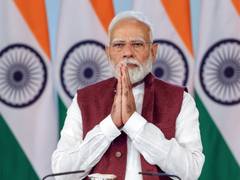Delhi breaks 41-year rainfall record, several areas waterlogged, more showers likely for next 2 days
New Delhi [India], July 9 (ANI): Delhi, on Saturday and Sunday, received heavy rainfall breaking a 41-year record.

Delhi recorded 153 mm of rain in 24 hours ending 8.30 am on Sunday, the highest in a single day in July since 1982, the IMD has said.
According to India Meteorological Department, New Delhi’s Safdarjung recorded the third highest 24-hour rainfall (for the month of July) on 8th-09th July, 2023, since 1958.
The Safdarjung weather station, which is the city’s weather base recorded 153 mm of rain till 8.30 am, the IMD said in a tweet along with the details of the five highest rainfall records of 24-hour rainfall in the month of July for New Delhi (Safdarjung) during 1958-2023.
In 1958, Safdarjung Observatory had recorded 266.2 mm of rain during the July 20-21 period while in 1982, it logged 169.9 during the July 25-26 period, IMD said.
Moderate to heavy rain continued to lash several parts of the city and its adjoining areas on early Sunday morning with the IMD predicting high-intensity showers over the National Capital for the next two days.
Amid the heavy rains in different parts of the country, India Meteorological Department (IMD) on Sunday predicted that rainfall activity will continue over Northwest India, but the intensity of showers may differ.
Dr Charan Singh, Head of the Regional Meteorology Center, New Delhi said, “The intensity of rain that was yesterday will be the same in the mountains today, although the intensity of rainfall will decrease in plains from today. Yet there are chances of heavy rainfall’.
“If I speak about Delhi NCR, still there are chances of heavy rainfall at 1-2 locations and then Delhi NCR will not be witnessing heavy rainfall for the next 4 to 5 days. Although rain will continue to occur intermittently, but the intensity will be less,” Singh said.
He further said that in Northwest India, Himachal Pradesh and Uttarakhand will witness extremely heavy rainfall for the next two days.
In view of incessant rains in the national capital, Union Home Minister Amit Shah on Sunday spoke to Delhi Lieutenant Governor Vinai Kumar Saxena and took updates.
Shah spoke to Delhi LG as moderate to heavy rain lashed several parts of the national capital and its adjoining areas. The downpour slowed down the traffic movement after waterlogging in several parts of the city.
Pictures and videos of commuters wading through knee-deep water flooded social media platforms, raising concerns about the efficiency of the city’s drainage infrastructure.
Considering the situation, Delhi Traffic Police kept updating Delhi’ites about traffic affected in parts of the city through its Twitter account by uploading pictures of the waterlogged areas.
In a recent alert through one such tweet, the Delhi Traffic Police mentioned, “Traffic is affected in the carriageway from Kalindi Kunj towards Okhla and vice-versa due to waterlogging and breakdown of vehicles at Okhla underpass. Commuters are advised to avoid these stretches”.
“Traffic is affected on Bhairon Marg in the carriageway from Ring road towards Mathura road and vice-versa due to waterlogging under Railway bridge Bhairon Marg. Traffic is diverted towards Pragati Maidan tunnel,” another tweet of the Delhi Traffic Police mentioned.
“Movement of traffic is restricted on old Delhi Gurugram road in the carriageway from Kapashera towards Dwarka due to maintenance work at T-point Samalkha. Kindly avoid the stretch,” read another tweet.
Strong winds and showers also caused disruptions in power and internet connectivity in several areas.
The India Meteorological Department (IMD), in a tweet on Sunday morning, has also said, “Thunderstorms with light to moderate intensity rain would occur over and adjoining areas of isolated places of Delhi.”
The places, where the rainfall was predicted, include Narela, Alipur, Rohini, Badili, Pitampura, Paschim Vihar, Punjabi Bagh, Kashmiri Gate, Seelampur, Rajauri Garden, Red Fort, Rajeev Chauk, ITO and Jafarpur.
As per the IMD, an interaction between a western disturbance and monsoonal winds is leading to an intense rainfall spell over northwest India, including Delhi which experienced the season’s first “very heavy” rainfall.






